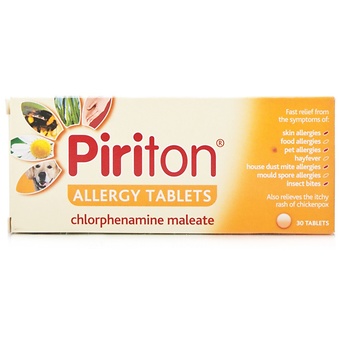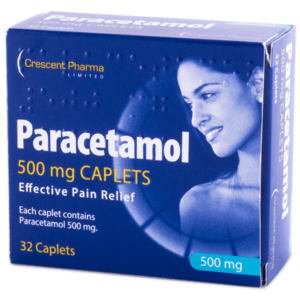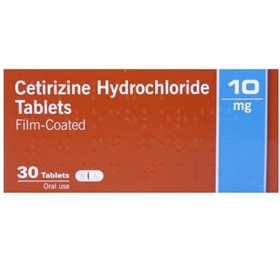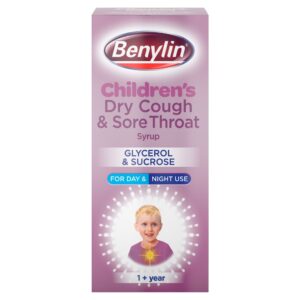Description
Piriton Allergy Tablets act as an antihistamine to keep you free from allergy symptoms. It contains the active ingredient Chlorphenamine which relieves the symptoms of allergies and itchy skin rashes.
An effective, reliable hay fever and allergy medication, you can purchase Piriton Allergy Tablets over-the-counter and without a prescription.
How Does Piriton Hayfever Tablets Relieve Allergy Symptoms?
Piriton Allergy Tablets contain Chlorphenamine as an antihistamine an active ingredient. Chlorphenamine works to reduce the effects of histamines when you have an allergic reaction and relieve you of the symptoms.
What is Piriton tablets effective for?
- Hayfever
- Dust mites and mould spore allergies
- Nettle rashes and hives
- Skin allergies and dermatitis
- Prickly heat and heat rash
- Allergic reactions to certain foods or food additives
- Medicine reactions
- Insect bites and stings
- Itching caused by chickenpox
Who is Piriton Hayfever Tablets Suitable for?
This Piriton product is suitable for adults and children aged 6 years and over. You must be at least 16 years old to purchase this product.
Uses / Instructions
Adults (including the elderly) and children aged over 12 years:
Take one tablet every 4 to 6 hours.
- Do not take more than 6 tablets in 24 hours.
- Children aged 6 to 12 years: Give 1/2 tablet every 4 to 6 hours.
- Do not give more than 6 half tablets in 24 hours.
- Children under 6 years of age: Not recommended.
If you (or someone else) swallow a lot of the tablets all together, or if you think a child has accidentally swallowed any of the tablets, contact your nearest hospital casualty department or your doctor immediately.
Do not drive if it is you who has taken too many tablets. Take these tablets with you so that the doctor can see what has been taken.
If you forget to take a tablet, take one as soon as you remember, unless it is nearly time to take the next one. Never take two doses together. Take the remaining doses at the correct time.
Warnings
Do not take Piriton Tablets:
• if you have ever had an allergic reaction to antihistamines or to any of the ingredients • if you have taken monoamine oxidase inhibitors (MAOIs) prescribed for depression in the last two weeks
• If you are taking other medicines containing other antihistamines, including products for the relief of colds and coughs. Take special care with Piriton Tablets
• Talk to your doctor before you take these tablets if you have very high blood pressure, heart disease, epilepsy, glaucoma, enlarged prostate, liver disease, kidney disease, bronchitis, asthma, bronchiectasis or chronic lung disorders (difficulty in breathing and cough that won’t go away).
• Avoid drinking alcohol with this medicine.
• Do not drive or operate machinery if the tablets make you feel drowsy, dizzy or if you experience blurred vision.
• If you have been told by your doctor that you have an intolerance to some sugars, contact your doctor before using Piriton Tablets.
• If you are taking other medicines
• Talk to your doctor or pharmacist before using this medicine if you are taking any prescribed medicines; particularly phenytoin (for epilepsy) or medicines for anxiety or to help you sleep.
Pregnancy and breast feeding
Talk to your doctor before taking Piriton Tablets if you are pregnant or breast feeding
Side Effects
Like all medicines, Piriton can have side effects, although not everyone will experience them. These side effects include:
- Drowsiness – some people may find this helpful if suffering from symptoms that become worse at night
- Allergic reactions which may be severe, e.g. raised and itchy skin, swelling of the face or mouth which could cause difficulty breathing
- Liver problems
- Anaemia or unexplained bleeding or bruising
- Difficulty passing water
- Collapsing
- Difficulty concentrating, feeling tired, dizziness, headache, blurred vision
- Loss of appetite, indigestion, feeling sick, being sick, diarrhoea, stomach pain, dry mouth
- Low blood pressure which may make you feel faint, changes in heart rhythm
- Chest tightness, thickening of the phlegm
- Skin peeling, itchy rash, sensitivity to the sun
- Ringing in the ears
- Twitching, muscular weakness, abnormal co-ordination
- Confusion, excitability, irritability, low mood, nightmares
- Excitability in children







Reviews
There are no reviews yet.